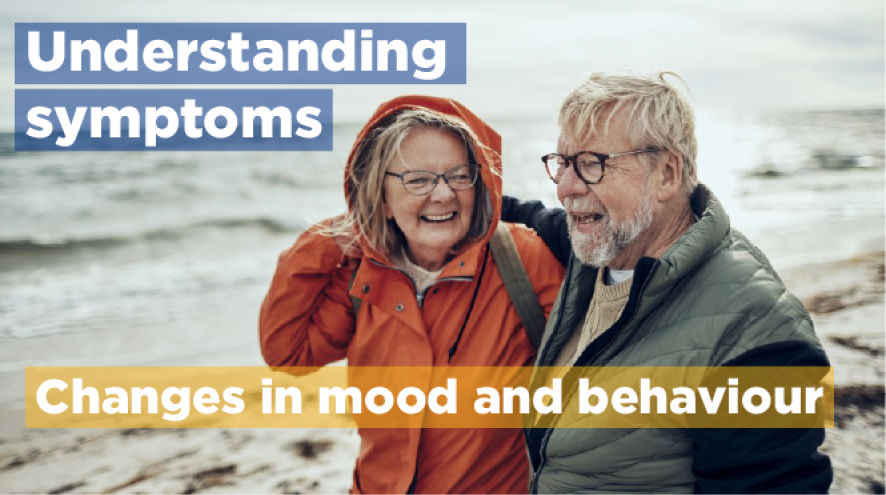Changes in mood and behaviour
Apparent changes in the personality of the person living with dementia are a major source of distress both to the person who is presenting the behaviours and to those who experience them.

Overview
We all feel our moods change from time to time. People living with dementia, however, can experience an absence of interest in or concern about emotional, social, spiritual, philosophical or physical life.
They may become depressed or withdrawn and lose interest in activities they used to enjoy. Sometimes, they may lose the ability to control their emotions.
It is important to remember that even in the later stages of the disease, the person living with dementia is still able to experience a variety of emotions such as joy, love, fear and sadness. Monitor their mood to ensure they are able to enjoy each day as fully as possible.
What is depression?
Depression is a condition in which people feel sad, hopeless or irritable most of the time. People with depression also experience anxiety and feelings of isolation. The number of people with depression rises over the age of 65.
Up to 40 to 50 per cent of people with dementia experience depression at some point. Depression can make the symptoms of dementias worse. For example, depression can cause increased forgetfulness, confusion, and anxiety.
It is important to diagnose depression in people with dementia because depression may respond to treatment.
The symptoms of depression can be similar to symptoms of dementia. Therefore, it is often difficult to identify depression in people with dementia. There are some common signs of depression to be aware of:
- Loss of interest in previously enjoyed activities
- Lack of energy
- Problems sleeping
- Increased confusion
- Loss of appetite and weight
If you are concerned about depression, speak to the person's doctor.
What is apathy?
Apathy is a word that describes loss of interest, motivation and/or persistence. It means not caring and not being social with others. The person with dementia may develop this apathy (become apathetic) and feel unmotivated to do anything. Apathy can be a symptom of depression but it can also occur separately from depression.
It can be distressing for a caregiver or family member to see the person with dementia withdrawing from social gatherings and other activities. Understanding the causes of apathy and how to respond to it can be helpful.
Possible causes
Possible causes of depression
- In the early stages of dementia, the person may experience depression after hearing his diagnosis.
- Social isolation may also cause depression in some people with dementia.
- Fatigue is associated with depressive symptoms.
- Depression can be a side effect of certain medications. Ask the person's doctor to review the drugs he is currently taking.
Possible causes of apathy
- Apathy happens because the frontal lobe, an area of the brain responsible for planning, judgment, and insight, becomes damaged.
- Apathy may also happen to a person with dementia who does not understand what is happening.
If you are worried about any of these symptoms, talk to your family doctor.
Tips and strategies
Responding to depression
- Encourage pleasant activities that she can still enjoy, such as short walks or outings.
- Set realistic expectations. If you expect too much from her, she may feel frustrated and discouraged.
- Establish a consistent daily routine. This will help reassure her as well as reduce confusion.
- Counselling, cognitive behavioural therapy, and group therapy may be helpful.
- Antidepressant medications may help. Talk to the person's doctor about the options.
Responding to apathy
- Try to engage the person with dementia in activities that she enjoys.
- Make sure that he can participate at all levels and that he is not overwhelmed.
- Try introducing a small amount of the activity at a time.
- Choose flexible activities that can be changed to suit the person’s needs.
- Emphasize more on the process of doing things and not the results.
- Avoid activities where he may not be able to complete the task.
- Make him feel valued and productive.
- Be ready to help him start an activity.
- Make her with dementia feel included in groups.
- Have her participate in activities that do not require active participation, such as listening to music.
- Some people with dementia may respond to a type of medication called a cholinesterase inhibitor. You may want to discuss this with a doctor.
Shifting focus: Guide to understanding dementia behaviour
This booklet is meant to help family members, friends and caregivers of people with dementia understand behaviours and actions.
It provides information about the following:
- Brain and dementia
- Recognizing and understanding the person’s actions and behaviours
- Supportive strategies
Additional resources
Depression in Older Adults: a guide for seniors and their families by the Canadian Coalition for Seniors' Mental Health includes resources on depression and prevention of suicide in older adults.
